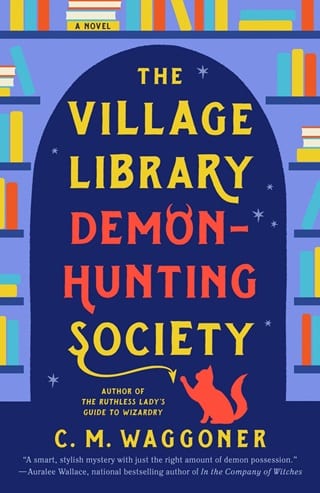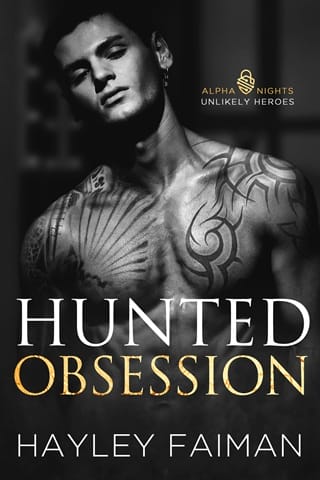Chapter Two
Two
It was always strange to be in a room that conspicuously lacked a dead body.
Most rooms didn't have any dead bodies in them, obviously. Even most of the rooms that Sherry spent time in usually weren't strewn with corpses. Most rooms, though, didn't feel as if every person in them was revolving around a spot where a dead person had just been. The spot was now occupied by a dark stain, and the stain dragged all the attention in the room toward itself like an exhausted child.
The usual crowd was all there, the people from the state crime lab bustling around while the local beat officers tried to look useful. Sheriff Brown just looked tired. Too tired even, it seemed, to make a show of wanting Sherry to get away from the crime scene. A while ago he'd taken to referring to her as the sheriff's office's "researcher and consultant," and at this point even the people from the state knew her. The photographer gave her a friendly wave. Sherry waved discreetly back, then looked around the gallery to try to get a sense of what might have happened in it.
The studio, at the moment, looked exactly like a crime scene. There were canvases strewn across the room as if someone had been rifling through them in search of somethin g specific. Things had been knocked off the table: a cup of paintbrushes had spewed its contents across a frayed Persian rug. A few paintings had been completely shredded, as if the unknown searcher had at one point taken out their fury on the canvases. The chaos didn't do much to distract from that stain. "Charlotte," Sherry said, "do you notice anything missing? Any particular paintings?"
"I don't know," Charlotte said. Her eyes moved around the room like a camera panning. "I can't tell. Everything is—"
"It's all right," Sherry said quickly. "You can— I'm sure that there will be plenty of time for you to take an inventory, or—is there an assistant?"
Charlotte was already shaking her head. "Just me," she said, and then her eyes welled up. Sherry looked away. She always thought that there was something indecent about staring at someone while they tried not to cry.
She decided to give Charlotte a moment to collect herself and wandered sidelong in the direction of Sheriff Brown. He, absurdly, began a sidelong shuffle of his own when he noticed her, as if he wanted to escape her without her noticing that he was trying to escape. They rotated around the stain in the center of the room like they were performing some macabre religious rite. Sherry made a tactical decision and came to a stop to pretend to peer at one of the canvases that had been flung to the floor, which forced Sheriff Brown to continue his rotation in her direction until he couldn't avoid acknowledging her. "Sherry," he said.
"Peter," she said back. She called him Peter out loud, and Sheriff Brown in her head, because she appreciated the storybook quality of an actual sheriff being someone with whom she sometimes worked to solve mysteries. His coworkers, she thought, ought to be Mortimer Mouse the Mortician and Tommy Turtle the Crime Scene Technician. She had to call Sheriff Brown Peter out loud partly because they'd known each other for long enough that it would seem strange if she didn't, and partly because if she called him Sheriff Brown she wouldn't be able to stop imagining him with furry ears and a tail and an oversized ten-gallon hat.
She and Peter (his name would be Peter if he was a storybook mouse, too: Peter Brown, Sheriff of Mousington) eyed each other for a long and uncomfortable moment. He couldn't, she knew, be the first to ask her a question: it would be a way of admitting that he had, at some point over the past few years, lost control over the pursuit of justice in Winesap, New York, and handed the investigative remote control over to an aging librarian who had changed the channel to PBS to watch the latest episode of Poirot . The metaphor had gotten away from Sherry. She wondered whether Peter ever imagined her as a storybook animal. If he did, she would probably be a fat old badger in a bonnet.
"I wonder," she heard herself saying, "why they didn't take anything from the gallery."
"Mm?" said Sheriff Brown.
Sherry felt herself retreating into a role. Miss Marple: pink and fluffy and unthreatening. "Oh," she said, her eyes wide. "I came for the opening last week and heard all about the paintings in the front gallery, and a few of them are by Charlotte's city friends, you know, and some of them are quite well-known , so the paintings are very expensive. One of them is on loan to the gallery, and Charlotte said that she was a bit worried about having it here because they don't have any security to speak of, because who would hire security in Winesap ? But I noticed, as I was coming in, that all of the paintings from the opening were still there, and only some of John's paintings are missing. John's paintings"—she dramatically lowered her voice—" aren't worth very much at all ."
She stepped back slightly to observe how Sheriff Brown had taken that. He looked annoyed, which was a satisfying response. Sheriff Brown always looked annoyed when he thought that she'd done a good bit of deducing. Sherry strongly suspected that Sheriff Brown found her talent for solving murders unendurably zany . The way that Sheriff Brown looked at her when she identified the perpetrator of a homicide based on a long, quiet conversation over tea and cookies she'd had with the murderer's mother reminded her of the way that her ex-husband had looked at her when he noticed her enjoying a nice Regency romance novel, as if he was embarrassed just to see her engaging in something so feminine and self-indulgent. Sherry was aware of the fact that anything she did, when done by her, became the sort of thing that matronly ladies who enjoyed Regency romances did. Men, in Sherry's experience, despised anything relating to matronly ladies who enjoyed Regency romances with a depth of feeling that she privately found a bit silly of them. What was the real harm, after all, in a woman quietly enjoying herself? They ought to feel grateful that the matronly ladies were peacefully reading novels instead of forming guerrilla organizations for throwing paint on antique cars and disrupting professional football games.
"So you think it was personal, then," Sheriff Brown said. He sounded resigned. "Not a robbery gone wrong." It's never a robbery gone wrong in Winesap , Sherry thought. Then she thought, Isn't it strange that—
The thought darted through Sherry's mind like a mouse. She tried to look at it more carefully, but it had already disappeared into a hole in a baseboard.
"Exactly," Sherry said, a moment too late. Then she added, reflectively, "Or a robber who doesn't know very much about modern art. I don't imagine that the very well-informed art robbers would come to Winesap, would they?"
"Probably not," said Sheriff Brown, sounding slightly cheered now. "They'd probably stay in the city ." Sheriff Brown always pronounced the words the city as if he were saying venereal disease . He, like many citizens of Winesap, thought of New York City as a place populated entirely by people who were all simultaneously wealthy snobs and desperate knife-wielding purse snatchers. Which is ironic, considering that the murder rate in Winesap is—
Into the hole in the baseboard again. Maybe Sherry was going senile. She was too young for it, she thought, but probably everyone who'd ever gone senile thought the same thing.
"So it might still be a robbery," Sheriff Brown said, with what Sherry thought was somewhat touching optimism. Poor Peter. All he wanted were some nice, normal, uncomplicated criminals to arrest. The man wilted from lack of petty larceny.
"It might," Sherry said agreeably, and then asked, "Do you have a cause of death?" She always felt very intelligent and professional when she asked that sort of question.
Sheriff Brown gave a brief, unattractive grimace. "No," he said, which could mean either No, we don't have a cause of death or No, I will not tell a Regency-romance-reading senior citizen who doesn't even work for the sheriff's department what the cause of death is.
"Oh," Sherry said, which she was fairly sure that Sheriff Brown knew meant, There's no use in your being coy: you know that I'll find out eventually . Then they engaged in a long moment of sustained, challenging eye contact before Sherry was struck by an overwhelming urge to giggle, mumbled something about, "Poor Charlotte, I think that I should…" and drifted off in Charlotte's general direction.
Once she got there, unfortunately, she realized that she still hadn't learned what the correct thing to say or do was for a person at that particular stage of grief. Charlotte was no longer crying—she'd moved on to looking quietly and horribly stunned—so tissues were no longer needed, but there wasn't time to bake her a casserole. Sherry took a moment to engage in something akin to prayer. What would Miss Marple do? she thought. Then the answer came to her. "Charlotte," she said, her voice very soft. "Why don't we go up to your apartment, and I'll fix you a nice cup of tea, and you can make any phone calls that you need to make." The bit about the phone calls probably wouldn't have been in a Miss Marple story. Sherry was improvising.
Charlotte looked at her for a moment as if she'd never seen Sherry before in her life. Then she nodded. "Thank you," she said. "It's just—this way." She gestured toward the other room, where a door marked private led to the stairway to Charlotte and her now late husband's apartment.
Sherry had been in Charlotte's apartment once before, for a cocktail party. She'd gotten a little tipsy and talked very animatedly about fashionable novels with Charlotte's fashionable friends, and not taken note of the décor. She took note now. There were lots of beautiful rugs and vases and interesting African sculptures, oddly juxtaposed with large prints of harshly lit photographs of very young-looking women's very cold-looking naked bodies. Sherry recognized the style of the photographs. There had been an exhibition of them at the gallery a year ago, and Sherry had noticed Charlotte's eyes sliding off them in the same way that Sherry tried to politely look away from other women in changing rooms. Not Charlotte's choice, Sherry thought, to put these particular pictures on her walls.
Sherry herded Charlotte to one of the wingback chairs in the living room before heading into the kitchen to look for a teakettle. She found one on the back of the stove, filled it, and put it on. She heard Charlotte say, "Mom?" and then start to cry. She was making those phone calls, then. Sherry took her time in the kitchen, waiting for the water to boil and then for the tea to steep. She found milk and sugar and containers for them, and then plates and some cookies. Oreos. The Oreos felt somehow out of place in this particular scene, like a boom mike drifting into the shot. She assembled everything onto a tray and carried it into the next room, where Charlotte was sitting quietly in her chair again, gazing into some spot between her face and the wall.
"Tea," Sherry said, pointlessly. Charlotte could see perfectly well that it was tea . She was grieving, not recovering from a traumatic brain injury. Sherry set the tray onto an extremely modern glass-and-metal coffee table. The table looked almost as ill at ease in the room as the naked-women photographs and Sherry.
"He was an asshole," Charlotte said. "That's what my mother just said. And it's true , he was an asshole. He was cheating on me, back in the city. With his ex-wife. And spending money we didn't have. We had to sell our apartment. That's why I agreed to move out here to the middle of nowhere, to make a fresh start away from all of that temptation. He was awful , sometimes, but I still—" She started to well up again.
"Oh," Sherry said, and sat down on the low sofa on the other side of the coffee table, barely taking a moment to contemplate the fact that she would almost certainly struggle to get up again. "I always thought he seemed as if he'd married up. You'd like to think that they could be more appreciative." By they , Sherry meant men . "You think that John might have been cheating on you now? Or taking on debt?" These might, she realized belatedly, be deeply inappropriate questions to ask a freshly bereaved young woman. On the other hand, Charlotte had brought it up first. Sherry poured tea. It was something to do.
Charlotte took the mug that Sherry offered her, cradling it in her hands as if she'd just come in from the snow and was trying to warm herself up. "I don't know," she said. Her voice was steady. "It's possible. Do you think that's what the police are thinking? That I murdered him because of the cheating? That I— killed him in a jealous rage , or something like that, or…for the insurance money? I don't know if he even had life insurance." A few minutes ago, she'd looked lost, stunned. Now she looked half nervous and half like she wanted to laugh. It was fortunate, Sherry thought, that Sheriff Brown wasn't in the room.
"I don't know," Sherry said honestly. "They might. They always look at the spouse first. I assume that he doesn't conveniently have a special will that leaves everything to an animal shelter? When was the last time you saw him alive?" Then she winced. "I'm sorry. I'm not being very comforting, am I?"
"Not really," Charlotte said. "I don't know if he even had a will. We never talked about it. Oh, God, we never talked about anything like that. I don't even know if he wanted to be buried or cremated."
"Well, I don't think that he'll care either way now," Sherry said briskly, and then nearly slapped a hand over her mouth.
Charlotte was staring at her. "You're really not how I thought you were," she said, after a pause so long that Sherry could practically hear it creaking.
"I'm sorry," Sherry said, truly contrite. She was sometimes shocked by herself, too. She spent so much time pretending to be a nice old lady from a book that her actual, somewhat strange and ghoulish personality tended to take her by surprise.
"No," Charlotte said, "I don't mind." Then she very deliberately selected an Oreo from the plate and ate the whole thing in one enormous bite.
Neither of them spoke. Charlotte chewed and swallowed. Then she said, "Do you think I'm a monster?"
"I don't think so," Sherry said. "Unless you killed your husband, which I don't think you did." Not that she had a reason to trust Charlotte, exactly. It was just that Sherry was pretty sure that Charlotte was much too intelligent and modern a woman to go to the risk of murdering her husband for cheating on her when she could easily divorce him instead. However much Charlotte was about to inherit, Sherry highly doubted it would be worth killing a man for, even if it was a man as obnoxious as John had been.
"Thank you," Charlotte said, with what sounded like complete sincerity, "for not thinking that I murdered my husband."
Their eyes met, and the entire conversation suddenly struck Sherry as so completely surreal that it made her giggle. For half an instant she was utterly horrified by herself, and then it registered that Charlotte was giggling, too. Sherry started giggling harder. They kept on like that for a while, each of them setting the other one off again whenever they started to calm down a little. Charlotte was the first to sober and clear her throat. "If the police were here, they probably would have arrested me right away for that," she said. "It's not funny, I know it's not. It just—it feels like I was cast in a bad movie without knowing it."
"Lucky that the police aren't here, then," Sherry said. "I don't think that they train them to be sensitive about the different ways that people grieve. Not in Winesap, at least." Sherry didn't know if she was sensitive about things like that, exactly. It was more that she could watch someone crying or laughing or rocking back and forth in a corner and feel curiosity instead of either suspicion or sympathy.
"You're better than the police," Charlotte said, with so much confidence that Sherry felt intimidated by the highly accomplished detective Charlotte was speaking to. "You'll help, won't you? With finding out who did it."
"Of course I will." Sherry took a sip of her tea, suddenly feeling too aware of the sound of her own voice. She always felt a little silly when she had to say very detective-y things out loud. Every phrase always sounded perfectly professional in her head but turned into lines from a very badly written TV show between the time they left her mouth and the time they hit her ears. It helped if she imagined herself as one of her favorite fictional detectives, none of whom would ever feel bashful about their detective-ing. She imagined herself with an enormous mustache, for self-confidence. "You'll have to be completely honest with me, you know. Sometimes people hide things because they're embarrassed or afraid that I'll tattle on them to the police, and I end up running around in circles for no real reason."
"Is tattle the professional term?" Charlotte asked, and then gave a very elegant little shrug. Sherry had never been to France, or even met a French person, but she'd always imagined the French people in books shrugging like Charlotte did. "I think you'd have to be an idiot to be more worried about local gossip than being arrested for a murder. I'm not an idiot."
"You're definitely not," Sherry said. "You're a very intelligent woman."
For a fraction of a second, Charlotte's face took on the expression of a precocious little girl who'd just been praised by a teacher. Then the look vanished and she gave another of those shrugs. "I'll cooperate," she said. "I'll be honest. But I don't know if I'll have much to tell you. I have no idea who could possibly want to kill John."
"You do, though," Sherry said. "At least, you very likely do, in my experience. You just haven't realized that you know it yet." She set down her teacup. "I should leave. Give you your privacy."
"Please don't," Charlotte said in a rush. "My mom won't be able to get here until tomorrow morning, and none of my friends will be here for hours. Just— God, I'm sorry, have you even eaten lunch?"
In all the excitement Sherry had completely forgotten about her egg salad sandwich. Now that she'd been reminded, she felt desperately hungry. "No," she admitted. "I'd just unwrapped my sandwich when you came into the library."
"Oh, I'm so sorry," Charlotte said, and looked lost again for a moment before she brightened. "Do you like onigiri?"
"I don't know what that is," Sherry said. "But I'm sure that I love it."
Charlotte smiled at her and went into the kitchen, then emerged again with a platter of food and a garnish of explanation, a soft flow of chatter about how she'd made these for lunch this morning, how her first roommate in New York had been from Japan and taught her how to cook, and how her mom had never gotten over Charlotte having been willing to learn to cook from a near stranger from a foreign country and not from her own mother. "She wasn't a stranger, though," Charlotte said. "She was my friend. We're still friends." She took a bite of one of the rice balls. Then she started to cry again.
Sherry kept her company for another hour or so. Charlotte put on some music, some Spanish guitar by a man whom, she said, she had met in a little bar in the West Village a few years ago. Charlotte was the sort of woman who had an interesting story to explain every part of herself. It made Sherry feel self-conscious about her own self, her own life, which was mostly all secondhand: experiences she'd had only through novels, places she'd seen on television, pieces of art she'd found at the Goodwill.
"You should go," Charlotte said. "I've kept you for too long."
"If you're sure," Sherry said, though her long absence was at this point probably severely straining the patience of the library staff. "Do you have anything to distract yourself with?"
Charlotte nodded. "I think I'll paint my nails," she said. "I usually do them every Friday. I know it sounds silly, but it always feels sort of…I don't know. Meditative. " Then she winced. "God, now I'm thinking about whether or not anything I do other than lying on the couch crying will make me look like an evil witch who just murdered her husband for the insurance money."
"Wear something unflattering while you paint them," Sherry suggested. "Like flannel pajamas. And keep drinking tea from a mug." If Charlotte was a glamorous murderess on Columbo , she would wear a marabou robe and probably not even own a mug. Also, she wouldn't paint her own nails. Sherry felt oddly guilty for having assumed that Charlotte must have paid someone a fortune to make her look so lovely all the time, when it seemed that she was actually just an artistic young woman with extremely steady hands. " Don't , under any circumstances, buy a bottle of champagne."
For a moment Charlotte appeared to be taking this all in as if it were legal advice. Then she huffed out a small laugh and shook her head. "Or a pink convertible."
They made eye contact, and Sherry felt suddenly as if she and Charlotte had been regularly having tea and Oreos under the watchful gaze of the poor, cold, naked women on the walls for years, as if Charlotte had been a very dear friend of hers all along. "I'll find out who did it," she said, with a confidence that seemed to come from outside herself. "And you'll be able to drink all of the champagne that you like without anyone to stop you." Then she showed herself out and hurried back to the library, where for a few precious hours she would be much too busy to chase any strange, unsettled thoughts about how neatly the recent events of her life reflected clichés that she had watched in rerun a dozen times before.
 Fullepub
Fullepub 



